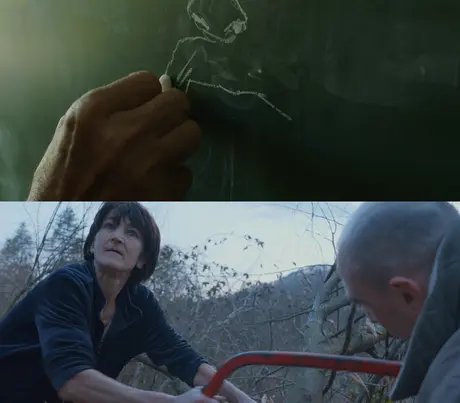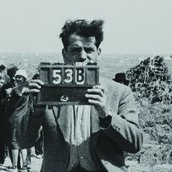
Twenty-five years after his abduction during the Kosovo War, painter Skender Muja recalls a crucial moment of survival. In the final months of the war, Muja and many other Albanian residents of Mitrovica were captured while attempting to flee Kosovo. They were held in a school that had been converted into an internment camp, frightened and facing an uncertain fate.
One day, a Serbian police commander gave Muja a terrifying ultimatum: he was to draw the commander's portrait on a school blackboard. ‘If it's good, you'll be spared. If not, I can't guarantee anything,’ he warned him. Under immense pressure, Muja began to draw. He knew that his life depended on his artistic ability.
The film Mua besoj më shpëtoj portreti alternates between two perspectives: Muja drawing the portrait and the tense faces of his fellow inmates. When the commander approves the drawing, Muja believes that it has saved his life. Through Muja's narrative, Mua besoj më shpëtoj portreti explores the power of art under the most oppressive circumstances.
Film 2:
Prekid vatre / Ceasefire
Hazira survived the Srebrenica massacre. She has been living in the Ježevac refugee camp near Tuzla for 29 years. She has never been able to return to her home village in the mountains above Srebrenica. Today, it lies in Republika Srpska, the Serbian part of Bosnia and Herzegovina. Political and social circumstances force Hazira to wait; her days are marked by routines that ensure survival. She collects firewood, cleans obsessively and defies the harsh conditions of camp life. She confronts the trauma of a war that continues to dominate her life with black humour and quiet resilience.
To keep the pain at bay, Hazira is constantly on the move, always in displacement of her memories, but also the present and the fear that everything could start all over again. This state of affairs is symptomatic of the current situation in Bosnia and Herzegovina. 2025 marks the 30th anniversary of the genocide in Srebrenica and the end of the war in the former Yugoslavia. The film is a tribute to all those people who are still suffering from the consequences of this war.
PROGRAMME
Greeting
Dr. Gundula Bavendamm, Director of the Documentation Centre for Displacement, Expulsion, Reconciliation
Ulrich Ziemons, Head of the Forum Expanded Section, Berlinale
Film screening
Film 1
- Mua besoj më shpëtoj portreti
- By: Alban Muja (Director, Screenplay)
- Country: Kosovo / Netherlands 2025
- Language: Albanian with English subtitles
- Running time: 10 minutes
- Berlinale section: Forum Expanded
Film 2
Prekid vatre
- By: Jakob Krese (Director), Meta Krese (Screenplay)
- Country: Germany / Italy / Slovenia 2025
- Language: Bosnian with English subtitles
- Running time: 30 minutes
- Berlinale section: Berlinale Shorts
Film discussion
- Alban Muja (Director Mua besoj më shpëtoj portreti)
- Annika Mayer (Producer und editor Prekid vatre)
- Moderator: Borjana Gaković (Film and media scholar)
FURTHER INFORMATION
Admission: 5.30 p.m.
Language: English
FREE ADMISSION
REGISTRATION REQUIRED
The Berlinale Spotlight – Forum Expanded & Berlinale Shorts is a collaboration between the Documentation Centre for Displacement, Expulsion, Reconciliation and the European Film Market (EFM) of the Berlinale.
Dates
December 2025
| Mo | Tu | We | Th | Fr | Sa | Su |
|---|---|---|---|---|---|---|
1
|
2
|
3
|
4
|
5
|
6
|
7
|
8
|
9
|
10
|
11
|
12
|
13
|
14
|
15
|
16
|
17
|
18
|
19
|
20
|
21
|
22
|
23
|
24
|
25
|
26
|
27
|
28
|
29
|
30
|
31
|



